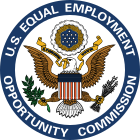
Back لجنة تكافؤ فرص العمل Arabic Equal Employment Opportunity Commission German Comisión para la Igualdad de Oportunidades en el Empleo Spanish کمیسیون فرصتهای شغلی برابر Persian 公平就业机会委员会 Chinese
 | |
| Agency overview | |
|---|---|
| Formed | July 2, 1965 |
| Jurisdiction | United States |
| Headquarters | 131 M Street, NE Washington, DC 20507 |
| Employees | 2,068 (FY21)[1] |
| Annual budget | $379,500,000 (FY18)[2] |
| Agency executives |
|
| Parent department | Independent Agency |
| Website | EEOC Official Website |
The U.S. Equal Employment Opportunity Commission (EEOC) is a federal agency that was established via the Civil Rights Act of 1964 to administer and enforce civil rights laws against workplace discrimination.[3]: 12, 21 The EEOC investigates discrimination complaints based on an individual's race, color, national origin, religion, sex (including sexual orientation, pregnancy, and gender identity), age, disability, genetic information, and retaliation for participating in a discrimination complaint proceeding and/or opposing a discriminatory practice.[4]
The commission also mediates and settles thousands of discrimination complaints each year prior to their investigation. The EEOC is also empowered to file civil discrimination suits against employers on behalf of alleged victims.[5][6] The Commission cannot adjudicate claims or impose administrative sanctions.[7] Since 2021, the chair of the EEOC is Charlotte Burrows.
- ^ "FedScope - Employment Cubes (Enhanced Interface)". www.fedscope.opm.gov. Archived from the original on 2021-04-21. Retrieved 2022-05-17.
- ^ "EEOC Budget and Staffing History". Archives. EEOC.gov. May 12, 2009. Archived from the original on December 9, 2009.
- ^ Van Loo, Rory (2018-08-01). "Regulatory Monitors: Policing Firms in the Compliance Era". Faculty Scholarship. 119 (2): 369. Archived from the original on 2020-06-04. Retrieved 2020-10-10.
- ^ "Discrimination by Type | U.S. Equal Employment Opportunity Commission". EEOC. Archived from the original on 2022-01-27. Retrieved 2022-01-27.
- ^ See "42 U.S.C. § 2000e-2 – Unlawful Employment Practices". Archived from the original on 2011-07-22. Retrieved 2010-02-04. and "42 U.S.C. § 2000e-3 – Other Unlawful Practices". Archived from the original on 2011-10-08. Retrieved 2010-02-04.
- ^ In addition, the EEOC, the Departments of Labor and Justice, the Civil Service Commission and the Office of Revenue Sharing have adopted Uniform Guidelines on Employee Selection Procedures to assist employers in complying with federal laws prohibiting employment discrimination."Uniform Guidelines On Employee Selection Procedures". Archived from the original on December 6, 2020. Retrieved February 2, 2010.
- ^ See{{cite Alexander v. Gardner-Denver Co., 415 U.S. 36, 44 (1974)